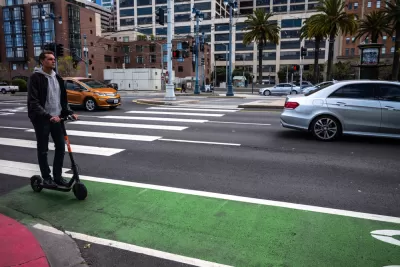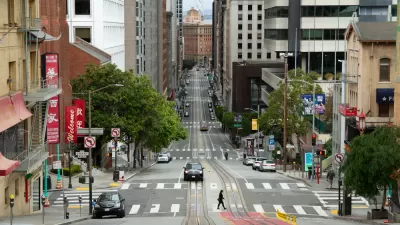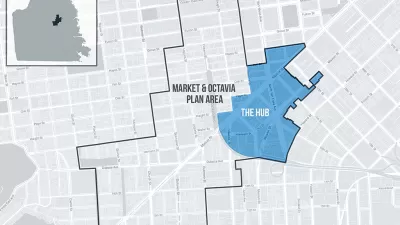San Francisco hoped a competitive permitting process would ensure considerations of equity in the operations of scooters in the city. The results haven't lived up to expectations.

Johanna Bhuiyan reports a scoop about the operations in San Francisco of the Scoot Networks electric scooter rental company.
"The company has drawn a red line around the centrally located but poverty-ravished Tenderloin and in parts of nearby Chinatown, preventing customers from dropping off scooters there," reports Bhuiyan.
The issue raised by the revelation is that Scoot Networks promised to deliver service on a more equitably than other providers. Instead, Scoot Networks had flagged seven "communities of concern" including the Tenderloin and Chinatown.
Scoot and another company, Skip, beat out better-funded rivals, Lime and Bird, to win a limited number of permits to operate in San Francisco, after a high profile competition that took place in 2018.
Bhuiyan explains the criteria that won Scoot the right to operate in San Francisco:
In evaluating applications for the pilot program, SFMTA specifically scored the companies on whether they included an “approach to providing service to low-income residents, including diverse payment options and fare discounts,” and whether they would serve areas “beyond the downtown core” and be committed to ensuring “availability of scooters in underserved areas.” Scoot and Skip beat out a bevy of better-funded rivals, including Bird and Lime, with the agency praising them for track records that “demonstrated not only a commitment to meet the terms of the permit, but a high level of capability to operating a safe, equitable and accountable scooter share service.”
Bird has since purchased Scoot, and most customers using Scoot and Skip in the city are, "predominantly white men who have a household income of $100,000 or more," according to survey data released by the SFMTA in April 2019 [pdf].
Since Bhuiyan reported the scoop, Joe Fitzgerald followed up on Bhuiyan's reporting with a new scoop. The transportation advocacy group Chinatown TRIP said they asked for scooters to be blocked from the area:
That’s because Stockton Street in Chinatown is a busy pedestrian thoroughfare trafficked by locals shopping in the area’s many shops, and is among the most heavily trafficked pedestrian corridors in The City. Walking is the primary mode of travel in Chinatown, according to the 2009-2013 American Community Survey.

Alabama: Trump Terminates Settlements for Black Communities Harmed By Raw Sewage
Trump deemed the landmark civil rights agreement “illegal DEI and environmental justice policy.”

Study: Maui’s Plan to Convert Vacation Rentals to Long-Term Housing Could Cause Nearly $1 Billion Economic Loss
The plan would reduce visitor accommodation by 25% resulting in 1,900 jobs lost.

Planetizen Federal Action Tracker
A weekly monitor of how Trump’s orders and actions are impacting planners and planning in America.

Grand Rapids Mayor Proposes Garage Conversion Plan
The mayor says allowing homeowners to convert garages to dwelling units could alleviate the city’s housing shortage.

Baltimore Ordered to Improve Sidewalk Accessibility
The city is one of many to face lawsuits for failing to comply with the Americans with Disabilities Act.

This Toronto Suburb Has More Bus Riders Than Columbus, Ohio
Brampton, Ontario used gradual improvements in service to prove that if you build it, they will ride.
Urban Design for Planners 1: Software Tools
This six-course series explores essential urban design concepts using open source software and equips planners with the tools they need to participate fully in the urban design process.
Planning for Universal Design
Learn the tools for implementing Universal Design in planning regulations.
Smith Gee Studio
Alamo Area Metropolitan Planning Organization
City of Santa Clarita
Institute for Housing and Urban Development Studies (IHS)
City of Grandview
Harvard GSD Executive Education
Toledo-Lucas County Plan Commissions
Salt Lake City
NYU Wagner Graduate School of Public Service





























